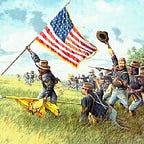#4 — What the Army Should Learn from Ukraine
Destroyer Self-Study Program
Team,
This week’s reading comes from a great mind in our Army. COL (Ret.) James Greer was an armor officer and one of our best strategists. An instructor at the Army’s School of Advanced Military Studies, COL Greer’s opinions and perspective have carried great weight with some of our most senior leaders and policymakers.
COL Greer’s essay, LSCO Lessons: What the Army Should be Learning About Large-Scale Combat Operations From the Ukraine War, is a timely reminder for us all to consider what lessons we can take away to improve our Army’s lethality and readiness. Much like the 1973 Yom Kippur War created a catalyst for a doctrinal and material change in the Army, we must see this war in Ukraine in similar regard.
COL Greer highlights areas of emphasis such as contested logistics, enduring operations affecting communications and mission command, multi-domain intelligence integration, and the theory that future operations will be both contiguous and non-contiguous. FM 3–98, Reconnaissance and Security Operations, gets a shout-out as addressing command node placement in both constructs. We must ensure that as we move forward through doctrinal and force design development these lessons are not lost or cast away.
Read the article at the link: https://mwi.usma.edu/lsco-lessons-what-the-army-should-be-learning-about-large-scale-combat-operations-from-the-ukraine-war/
Thanks for everything you do each day.
Questions for Consideration
1. What are some of the main lessons of the Ukraine War we can use to develop our Programs of Instruction?
2. How has studying the Ukraine War over the past 6 months changed how you view combined arms?
